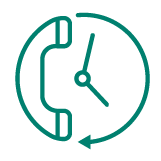Time for a savings check-in
With rising inflation and a shifting economic outlook, now is a good time to review your financial picture.
Reviewing your savings and investment goals and ensuring your money is in suitable investments to reach those goals is something you should do regularly.
Protect your savings from inflation.
As global economies recovered from the effects of the COVID-19 pandemic, increased demand for goods and services and supply chain challenges led to a substantial rise in inflation. When inflation exceeds your rate of return, your purchasing power decreases even if your actual savings grows. If you are steadily saving money for a specific goal, such as an education fund for your children or a down payment on a home, your money may need to catch up to the increases in the cost of those goals.
Term deposits can be a great way to save money as they provide several benefits. Firstly, they offer higher rates of interest than regular savings accounts, meaning that you can earn more from your money over the course of the deposit. Term deposits also provide security and stability for your savings - since the rate is fixed for the length of the term, you know exactly how much interest you will be earning when it matures. This makes them suitable investment vehicles to save for large expenses such as holidays or a new car, as you can plan ahead knowing how much interest you can expect. What will work best for you depends on your savings timeline and how accessible you want your funds to be.
Alternative investment vehicles like stocks, bonds, mutual funds and other securities have historically outpaced inflation and have been great long-term investment vehicles but may not be suitable for everyone. Factors such as your risk tolerance, time frame for investing, liquidity needs, and investment experience must be considered when assessing the suitability of alternative investments.
Understand the effects of rising interest rates on your money
To rein in spiking inflation, the Bank of Canada began increasing interest rates last year.
Higher interest rates are typically good for savers but challenging for borrowers. It’s important to look at the impact of higher interest rates on your overall financial picture. If you have debt, such as a mortgage, loan, or an outstanding balance on a credit card, you may be paying more money to service that debt. It is worth considering whether it is more beneficial to focus on paying down debt versus saving more money, particularly if the interest you will receive on your savings is substantially below the interest rate on your debt.
Saving money always has a place in your financial strategy, even if you have debt. At a minimum, it’s important you have an emergency fund that can cover 3-6 months of expenses, so you’re protected if something unexpected comes up.

Open a term deposit today
Our local team of experts can help you determine:
How term deposits can help you achieve your financial goals
How to use multiple term deposits to your advantage
We are always here to help
These articles are made available to you as tools for independent use and are not intended to provide investment advice. We cannot and do not guarantee their applicability or accuracy. All examples are hypothetical and are for illustrative purposes only. Please visit your branch to seek personalized advice from qualified professionals for all personal finance issues.








